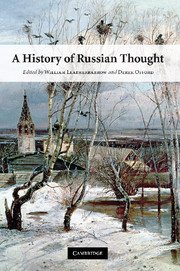Book contents
- Frontmatter
- Contents
- Preface
- List of contributors
- Dates, transliteration and other conventions
- Dates of reigns
- Russian titles of journals, newspapers and miscellanies
- PART I CONTEXT
- PART II INTELLECTUAL CURRENTS
- PART III THEMES AND CONSTRUCTS
- PART IV THE AFTERLIFE OF CLASSICAL THOUGHT
- 14 Continuities in the Soviet period
- 15 Dialectical materialism and Soviet science in the 1920s and 1930s
- 16 Afterword
- Biographical details of thinkers and writers
- Selected bibliography
- Index
16 - Afterword
Published online by Cambridge University Press: 05 June 2012
- Frontmatter
- Contents
- Preface
- List of contributors
- Dates, transliteration and other conventions
- Dates of reigns
- Russian titles of journals, newspapers and miscellanies
- PART I CONTEXT
- PART II INTELLECTUAL CURRENTS
- PART III THEMES AND CONSTRUCTS
- PART IV THE AFTERLIFE OF CLASSICAL THOUGHT
- 14 Continuities in the Soviet period
- 15 Dialectical materialism and Soviet science in the 1920s and 1930s
- 16 Afterword
- Biographical details of thinkers and writers
- Selected bibliography
- Index
Summary
From the time of Peter the Great, Russian social thought has been persistently both introspective and forward-looking – that is, it has been dominated by attention to its own land and to that land's future. However disparate the world-views of the individual thinkers discussed in this volume, the progressives and the conservatives alike were preoccupied with hopes, fears, dreams, warnings, forecasts and other anticipations of what the future held in store for Russia. The progressives dreamt of achieving a prosperous and powerful nation through enlightenment and modernisation, on the model of the western European states of the day. The conservatives, too, looked forward to a rich and strong nation, but one that, by preserving and nurturing the distinctive features of Russian culture, would avoid what they saw as the errors and diseases of the western world.
After all the attention in this volume to what Russia would, should or might become, it may be worthwhile in conclusion to compare our thinkers' visions with what Russia has become in the three centuries since Peter the Great's modernising efforts began. How close did these thinkers come to anticipating the subsequent development of their country? What did they accurately foresee, and what did they miss? Which of their hopes and fears came true, and which did not? Entertaining questions of this sort may throw some light on the complex link between social thought and historical reality, not only in the case of Russia but in regard to other modernising nations as well.
- Type
- Chapter
- Information
- A History of Russian Thought , pp. 368 - 379Publisher: Cambridge University PressPrint publication year: 2010

